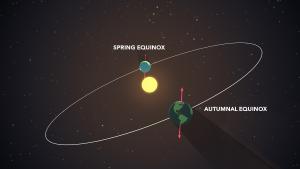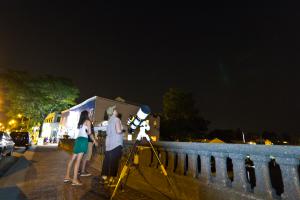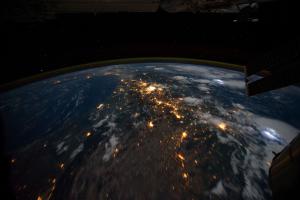
Stargazing Nights - CLOSED
- Where:
- Frosty Drew Observatory
- When:
- Friday March 15, 2019 - CLOSED
- Cost:
- $5 Suggested Donation per person 5 years and older
Tonight is Stargazing Night and forecasts are looking terrible. We can expect rain, a t-storm, high winds, fog, and full cloud cover for the first part of the night and into the early morning hours. This forecast leaves practically no chance for us to observe through our telescopes. So we will keep the Observatory and Sky Theatre closed tonight. We’ll return to our regular Stargazing Nights schedule on Friday, March 22, 2019.
--------------------------------
Weekly Happenings
Scott MacNeill
On Wednesday, March 20, 2019 at 5:58 p.m. EDT, Earth’s equator will intersect with the ecliptic (the path the Sun takes across the sky) marking the Vernal Equinox, and the start of spring in the Northern Hemisphere. At this time the Earth arrives at the point in its orbit where it is neither tilted towards or away from the Sun. This results in equal amounts of daylight for corresponding locations north and south of the equator, with the Sun passing directly overhead (at zenith) when viewed along the equator at Noon. Wednesday also marks a switch in daytime length, to a period of the year where the days are longer than the nights. So take a moment this coming Wednesday to step outside and welcome the mud laden, mosquito pending, pollen attack of spring, and take solace in the heat induced craziness that’s just around the corner, including beach days, late sunsets, picnics, and fabulous nights under the Milky Way. Happy first day of spring!
This past Tuesday, March 12, 2019, Rhode Island lost one of its bright stars, when our close friend Mary Grady passed away. Mary is one of the founders of the RI Sidewalk Astronomers, alongside Lights in the Dark’s Jason Major, and Frosty Drew Observatory’s Scott MacNeill; as well as a huge advocate and contributor to the Rhode Island public outreach astronomy community. Truly a remarkable person, Mary believed in making the world a better place for all by raising public awareness of the natural world. Among Mary’s numerous accomplishments, she was a contributing writer for Rhode Island Monthly magazine, wired.com, and other publications; was an editor for AvWeb.com, the National Geographic Society, and the Providence Journal; an aircraft and hot air balloon pilot; an FAA-certified ground-school instructor; an adjunct professor of Geography at Rhode Island College; helped secure Passeonkquis Cove in Warwick as conservation land; was a kind advocate for the arts and science; and was one of the most sensational and inspiring people to have known. A little reminder hung in her studio that stated “Follow the Path with Heart”, and Mary certainly did that.
Starting this coming Wednesday, March 20, the International Space Station (ISS) returns to the evening sky, with visible passes happening nightly over the United States, specifically the Northeast. Now that we are moving into longer days, the ISS has a better chance of being in sunlight while observers are in darkness, which makes for more frequent and longer passes. Best passes this week:
Wed, Mar 20 at 8:53p ET, starting in SW, rising to 26°, heading towards the SW and into Earth’s shadow
Thu, Mar 21 at 8:02p ET, starting in SSW, rising to 37°, heading towards the E and into Earth’s shadow.
Read up on why we only see the ISS periodically during the year and not every night. If you catch a photo of the ISS passing by, post it on our Facebook and we’ll share it on our time line. Pass times listed above are for Southern New England and generally applicable to the Northeast. For pass times specific to your location, visit NASAs Spot the Station. You can also grab pass times for the ISS and other satellites applicable to Southern New England (and generally the Northeast) on the Frosty Drew Observatory website. No get out and welcome spring with an inspirational view of humans living in space!
-Scott



